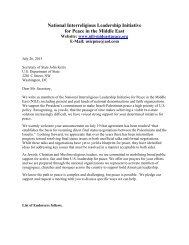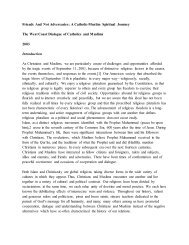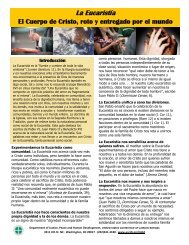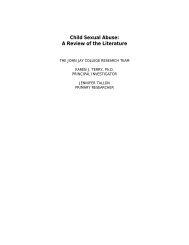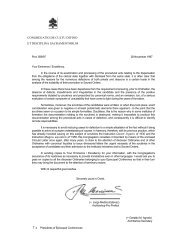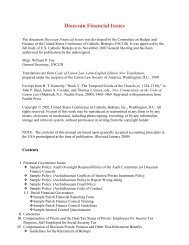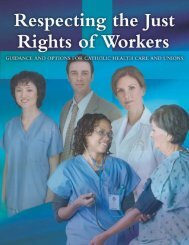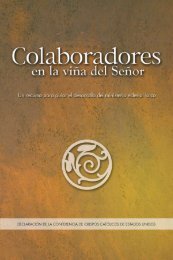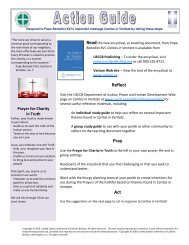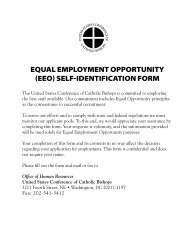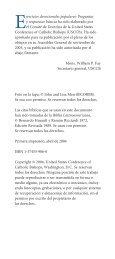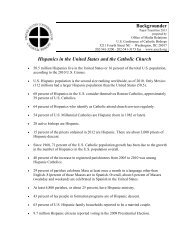Doctrinal Elements of a Curriculum Framework for the Development ...
Doctrinal Elements of a Curriculum Framework for the Development ...
Doctrinal Elements of a Curriculum Framework for the Development ...
- No tags were found...
You also want an ePaper? Increase the reach of your titles
YUMPU automatically turns print PDFs into web optimized ePapers that Google loves.
IV. Overview <strong>of</strong> <strong>the</strong> BibleA. Old Testament (CCC, nos. 121-123, 138).1. This is <strong>the</strong> name given to <strong>the</strong> <strong>for</strong>ty-six books whichmake up <strong>the</strong> first part <strong>of</strong> <strong>the</strong> Bible and recordsalvation history prior to <strong>the</strong> coming <strong>of</strong> <strong>the</strong> Savior,Jesus Christ (CCC, no. 120).a. Many Protestant Bibles have only thirty-ninebooks in <strong>the</strong> Old Testament; o<strong>the</strong>r ProtestantBibles contain <strong>the</strong> additional seven, referringto <strong>the</strong>m as “deuterocanonical.”b. Catholics rely on <strong>the</strong> Greek version <strong>of</strong> <strong>the</strong> OldTestament <strong>for</strong> <strong>the</strong>ir Bible, while Protestantstend to rely on a Hebrew version.2. It is called <strong>the</strong> “Old” Testament because it relatesGod’s teaching and actions prior to <strong>the</strong> coming <strong>of</strong>Jesus Christ, who is <strong>the</strong> fullness <strong>of</strong> Revelation. Italso focuses on <strong>the</strong> covenant God made with <strong>the</strong>Jewish people, which is called <strong>the</strong> “Old Covenant”to distinguish it from <strong>the</strong> New Covenant made byJesus Christ (CCC, nos. 121-123).3. The Old Testament contains <strong>the</strong> Pentateuch,<strong>the</strong> Historical books, <strong>the</strong> Wisdom books, and <strong>the</strong>Prophetic books.B. New Testament (CCC, nos. 120, 124-127).1. This is <strong>the</strong> name given to those twenty-sevenbooks which compose <strong>the</strong> second part <strong>of</strong> <strong>the</strong> Bibleand which focus on <strong>the</strong> life and teachings <strong>of</strong> JesusChrist and some writings <strong>of</strong> <strong>the</strong> early Church.2. The New Testament is composed <strong>of</strong> <strong>the</strong> Gospels,<strong>the</strong> Acts <strong>of</strong> <strong>the</strong> Apostles, <strong>the</strong> Epistles or Letters,and <strong>the</strong> book <strong>of</strong> Revelation.C. The unity <strong>of</strong> <strong>the</strong> Old Testament and <strong>the</strong> NewTestament (CCC, nos. 124-125, 128-130, 140).V. The GospelsA. The Gospels occupy <strong>the</strong> central place in Scripture(CCC, nos. 125, 139).1. They proclaim <strong>the</strong> Good News <strong>of</strong> Jesus Christ, <strong>the</strong>Word <strong>of</strong> God, <strong>the</strong> definitive Revelation <strong>of</strong> God.2. The Gospels contain a record <strong>of</strong> <strong>the</strong> life <strong>of</strong> JesusChrist and <strong>of</strong> his teachings and redeeming work.3. The Gospels lead us to accept Jesus Christ in faithand apply his teachings to our lives.B. Three stages in <strong>the</strong> <strong>for</strong>mation <strong>of</strong> <strong>the</strong> Gospels (CCC,no. 126).C. The Synoptic Gospels: Mat<strong>the</strong>w, Mark, and Luke.1. Approximate dates <strong>for</strong> each Gospel.2. What is known about each <strong>of</strong> <strong>the</strong>se threeevangelists.3. The churches <strong>for</strong> whom Mat<strong>the</strong>w, Mark, andLuke wrote.4. The contents <strong>of</strong> <strong>the</strong> Synoptic Gospels (CCC, nos.512-667).a. Infancy narratives in Mat<strong>the</strong>w and Luke.b. The Baptism <strong>of</strong> Jesus.c. The Temptation <strong>of</strong> Jesus.d. Sermon on <strong>the</strong> Mount in Mat<strong>the</strong>w; Sermon on<strong>the</strong> Plain in Luke.e. Jesus’ teaching, including <strong>the</strong> parables.f. The miracles.g. Last Supper, <strong>the</strong> Passion, Death, Resurrection,Ascension (CCC, nos. 1329, 1337, 1366,1323, 1412, 1521-1522, 1532, 1708, 1992,2020).D. The Gospel <strong>of</strong> John.1. Approximate date <strong>of</strong> <strong>the</strong> Gospel and churches <strong>for</strong>which John wrote.2. What is known about John.3. The content <strong>of</strong> <strong>the</strong> Gospel <strong>of</strong> John.a. The Prologue (CCC, nos. 241, 291).b. John uses Christ’s dialogues and personaltestimony and is more mystical (CCC, nos.547-550).c. John treats miracles as signs <strong>of</strong> Christ’s glory/divinity—flows from John 1:14.d. The Bread <strong>of</strong> Life discourse (Jn 6).e. Christ’s Last Supper discourse and priestlyprayer.f. The Passion, Death, Resurrection.VI. ChallengesA. Is it true that Catholics do not use or read <strong>the</strong> Bible?1. No. Catholics use <strong>the</strong> Bible regularly. The Bibleor Scripture is an integral part <strong>of</strong> Catholic prayerlife, <strong>for</strong>ming part <strong>of</strong> every Mass, every sacramentalcelebration, and <strong>the</strong> <strong>of</strong>ficial daily prayer <strong>of</strong> <strong>the</strong>Church—<strong>the</strong> Liturgy <strong>of</strong> <strong>the</strong> Hours (CCC, nos.141, 1190).2. The Church urges Catholics to use <strong>the</strong> Bible inpersonal prayer (CCC, nos. 2653-2654).3. Scripture study and prayer groups using Scriptureare a common part <strong>of</strong> parish life.4. In <strong>the</strong> fourth century, St. Jerome said that“ignorance <strong>of</strong> <strong>the</strong> Scriptures is ignorance <strong>of</strong> Christ”;this underlines <strong>the</strong> importance <strong>of</strong> Scripture in <strong>the</strong>life <strong>of</strong> <strong>the</strong> Church (CCC, no. 133).4<strong>Doctrinal</strong> <strong>Elements</strong> <strong>of</strong> a <strong>Curriculum</strong> <strong>Framework</strong> <strong>for</strong> <strong>the</strong><strong>Development</strong> <strong>of</strong> Catechetical Materials <strong>for</strong> Young People <strong>of</strong> High School Age



